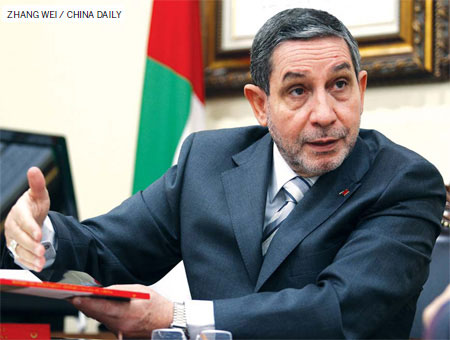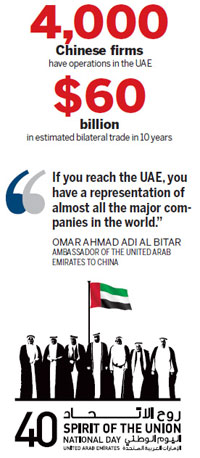China-UAE: Ancient ties, modern engagement
Updated: 2011-12-02 08:10
By Zhang Zhao (China Daily)
|
|||||||||
 |
|
Omar Ahmad Adi Al Bitar, ambassador of the United Arab Emirates to China. |
"If you reach the UAE, you reach the world," said Omar Ahmad Adi Al Bitar, ambassador of the United Arab Emirates to China.
Celebrating its 40th birthday today, the country has witnessed great changes from a barren desert to a modern society over just a few decades. And according to the ambassador, transportation, communication and infrastructure are some of the main factors in its success.
They are the "three things you provide and the world will come to you", he said.
Enjoying a "central location" on the world map, the UAE has been a transportation hub throughout history, where "traveling from east to west, you have to stop", said Al Bitar. "If you have the right infrastructure and support, then the country becomes very attractive."
In fact, the country is still playing a key role today in linking the East with the West. Its government has planned to make the UAE a world hub that draws businesses and economies from around the world.
"If you reach the UAE, you have a representation of almost all the major companies in the world," said Al Bitar. "You don't have to travel (further) because you can do your business in the UAE.
"Companies decide to meet in the UAE because there you will find every service possible. You finish your deals in the UAE. You have laws and regulations that are simple and quick."
|
 |
"We have a solid and secure financial and monetary system," he added. "You can transfer money in one hour from one place to another."
As one of the world's largest oil producer, the UAE has an economy that once relied primarily on oil production.
But the authorities are trying to reduce its dependency on oil exports by diversifying the economy through creation of businesses, tourism and construction sectors.
Today, oil income contributes around 30 percent of the country's revenue.
"All major UAE cities are modern and elegant," said the ambassador. "They provide first-class services and tourism facilities."
Modern facilities
Certainly one of its most eye-catching projects is the highest building in the world, the Burj Khalifa - more commonly known as the Dubai Tower - that was completed in record time. The UAE also has top-rated hotels and modern transportation and communication systems.
The UAE has one of the world's largest airports and 26 seaports, 15 of which meet international standards. It also has one of the largest dry docks for ship repair and maintenance.
The country offers better healthcare and education to its people, according to Al Bitar, and is on the way "to securing overall technological advancement in all domains and establishing fully fledged industrial zones".
Dubai's International Media and Information City has attracted many of the world's major news providers including CNN, CNBC, and China's Xinhua News Agency and CCTV, so that "you don't need to move, and can reach the world's information in one city", said Al Bitar.
The country has begun a long-term plan called Vision 2021 with the goal of becoming "among the best countries in the world" when the country celebrates its 50th anniversary golden jubilee.
"We are a small country compared to China, yet we can do wonders," said Al Bitar.
He said he believes the infrastructure is "the basis of everything else", but construction is only part of the ambitious plan, which actually covers "every domain", including health, education, innovative technology, the environment and social development.
Not only oil
"The UAE and China enjoy special relations of a strategic nature," said the ambassador.
Trade between the two nations dates back to the ancient Silk Road some 2,000 years ago. Today, the UAE ranks as the second largest trade partner to China in the Middle East - and the first, excluding oil.
There are about 4,000 Chinese companies in the UAE, according to Al Bitar, and "almost every major Chinese agency has an office or a representative in the country". Not surprisingly, the largest Chinese community in the Middle East is in the UAE.
Despite the difference in size, the UAE and China "complement each other", he said. "And the UAE will become an indispensable economic base for China towards the West."
The countries have started a series of joint projects in construction, industry and commerce.
Al Bitar said annual bilateral trade volume was about $30 billion before the financial crisis broke out in 2008.
Although the number has gone down due to the crisis, it is "now picking up again". He estimates it will reach some $60 billion in 10 years.
"Maybe the only barrier would be the language, but we are overcoming that as well," said Al Bitar.
There are two Confucius Institutes at UAE universities, teaching Chinese language and promoting Chinese culture.
Other cultural exchange programs include the Culture Dialogue conference between China and the Arab countries scheduled to begin this month in the capital Abu Dhabi.
"Although we have been connected for centuries, we are reviving the old and starting something new," said the ambassador.











